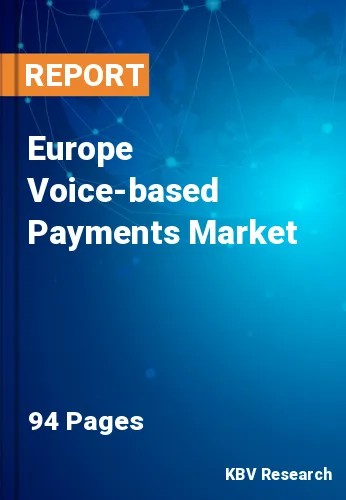The Europe Voice-based Payments Market would witness market growth of 11.4% CAGR during the forecast period (2022-2028).
Conversations with virtual assistants will eventually become less "mechanical" and closer to natural human dialogue as neuro-linguistic programming (NLP) and speech recognition capabilities advance. The next steps of speech technology development involve understanding the context of queries, identifying accents, and distinguishing distinct voices. As digital voice assistants get more advanced, they will be able to do more than just accept payments via voice. Users also are able to deal with financial institutions and handle more complex duties such as generating invoices, paying taxes, obtaining loans, and renewing insurance. All of these tasks will be voice-activated and accessible from a smartphone, wristwatch, linked car, and home system at any time.
The market is likely to increase as financial institutions and merchants continue to roll out voice-based payments to gain seamless access to personal data and better understand customer behavior. Voice-activated controls for financial and banking tasks have begun to be rolled out by mobile payment companies such as Zelle, PayPal, and Venmo. Traditional banks, such as Wells Fargo, are also incorporating conversational voice interfaces into their mobile banking apps to make it easier for their consumers to access all of their financial services.
In 2021, Germany had an 83% smartphone penetration rate and an 89% overall internet penetration rate. This is good news for the voice-based payments market in the region. Since broadband connections are widely available, the country's digital infrastructure outperforms the European average, making it a good foundation for the developing FinTech sector. FinTech companies in Germany have a wide range of financing possibilities. While corporate and private venture capitalist (VC) investments in the sector were expected to reach more than $880 billion by 2020, banks and other investors were also interested. Munich, Berlin, Frankfurt, Hamburg, and the major cities in North Rhine-Westphalia are all important FinTech hubs.
The largest FinTech subsector is digital payments via digital commerce or mobile point-of-sale (POS) payments. Digital payments in Germany are predicted to grow at a 14 percent annual rate, from $140.4 billion in 2020 to $274.8 billion in 2025, matching the global average. In addition, in 2020, the country had the highest number of digital commerce users in Europe.
The Germany market dominated the Europe Voice-based Payments Market by Country in 2021, and would continue to be a dominant market till 2028; thereby, achieving a market value of $807.3 Million by 2028. The UK market is poised to grow at a CAGR of 10.4% during (2022 - 2028). Additionally, The France market would display a CAGR of 12.2% during (2022 - 2028).
Based on Component, the market is segmented into Software and Hardware. Based on Organization Size, the market is segmented into Large Enterprises and Small & Medium Enterprises. Based on End-use, the market is segmented into BFSI, Retail, Automotive, Government & Defense, Healthcare & Life Sciences, and Others. Based on countries, the market is segmented into Germany, UK, France, Russia, Spain, Italy, and Rest of Europe.
Free Valuable Insights: The Global Voice-based Payments Market will Hit $12.2 Billion by 2028, at a CAGR of 11.6%
The market research report covers the analysis of key stake holders of the market. Key companies profiled in the report include Google LLC, Amazon.com, Inc., Alibaba Group Holding Limited, Huawei Technologies Co., Ltd. (Huawei Investment & Holding Co., Ltd.), Cerence, Inc., PCI Pal PLC, Paysafe Limited, NCR Corporation, PayPal Holdings, Inc., and Vibe Group (Vibe Pay Limited)
By Component
By Organization Size
By End-use
By Country
Our team of dedicated experts can provide you with attractive expansion opportunities for your business.

